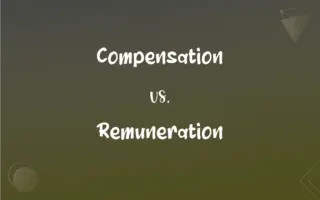Agnosia vs. Aphasia: What's the Difference?
Edited by Aimie Carlson || By Janet White || Published on January 22, 2024
Agnosia is the inability to process sensory information, recognizing objects, people, sounds, or shapes, while aphasia is a disorder affecting language comprehension and production, often due to brain damage.

Key Differences
Agnosia and aphasia are both neurological disorders, but they affect different aspects of cognitive function. Agnosia is characterized by an inability to recognize and identify objects or persons, even though the sensory mechanisms are intact. For example, a person with visual agnosia may not recognize a familiar face or common objects, despite having normal vision. In contrast, aphasia involves difficulties with language, affecting the ability to speak, write, and understand spoken or written language. This condition often arises from damage to areas of the brain responsible for language processing, such as Broca's or Wernicke's areas.
Both agnosia and aphasia can significantly impact daily life, but they do so in different ways. Agnosia can make it challenging to navigate the environment or interact with people and objects, as the brain cannot correctly interpret sensory information. This condition does not affect intelligence, but rather the processing of sensory inputs. On the other hand, aphasia affects communication abilities. People with aphasia may struggle to find the right words, form coherent sentences, or comprehend what others are saying. This can lead to frustration and social isolation, as communication is key to most interactions.
The causes of agnosia and aphasia can also differ. Agnosia is usually the result of neurological damage to the brain areas responsible for interpreting sensory information, such as from a stroke, head injury, or neurological disorder. It can affect various senses, leading to different types of agnosia, like auditory or tactile agnosia. Aphasia, meanwhile, is most commonly caused by stroke or brain injury affecting the language centers of the brain. It can also result from brain tumors, infections, or degenerative diseases like Alzheimer's disease.
Diagnosis and treatment for agnosia and aphasia vary based on the underlying cause and the affected individual's needs. For agnosia, treatment focuses on compensatory strategies to help the person adapt to their sensory recognition challenges. Occupational therapy and visual or auditory aids can be beneficial. In contrast, treatment for aphasia often involves speech and language therapy to improve communication skills. This therapy may include exercises to improve speaking, understanding, reading, and writing, as well as the use of alternative communication methods like gestures or picture boards.
Comparison Chart
Impairment Type
Sensory recognition
Language processing
ADVERTISEMENT
Common Causes
Brain injury to sensory areas
Brain injury to language areas
Primary Symptoms
Inability to recognize objects, sounds, faces
Difficulty in speaking, understanding language
Variations
Visual, auditory, tactile
Expressive, receptive, global
Diagnostic Focus
Sensory processing tests, brain imaging
Language tests, brain imaging
Agnosia and Aphasia Definitions
Agnosia
Sensory Recognition Disorder.
Despite seeing the clock, she couldn't recognize its purpose due to agnosia.
ADVERTISEMENT
Aphasia
Language Comprehension Impairment.
He struggled to understand spoken words, a symptom of receptive aphasia.
Agnosia
Face Recognition Difficulty.
She couldn't recognize her family's faces, a challenge posed by facial agnosia.
Aphasia
Speech Production Disorder.
Forming coherent sentences was difficult for her due to expressive aphasia.
Agnosia
Object Identification Impairment.
Agnosia made it impossible for him to recognize his own car.
Aphasia
Communication Difficulty.
Aphasia made it hard for him to follow conversations.
Agnosia
Neurological Perception Issue.
Even familiar voices sounded unfamiliar to her because of agnosia.
Aphasia
Verbal Expression Struggle.
Finding the right words was a constant battle due to his aphasia.
Agnosia
Sensory Information Processing Disorder.
He could feel the object but couldn't identify it, a symptom of tactile agnosia.
Aphasia
Reading and Writing Challenges.
She couldn't read her favorite book anymore, a consequence of aphasia.
Agnosia
Loss of the ability to interpret sensory stimuli, usually leading to the inability to identify or recognize objects using one or more senses.
Aphasia
Partial or total loss of the ability to articulate ideas or comprehend spoken or written language, resulting from damage to the brain from injury or disease.
Agnosia
(neurology) The inability to recognize objects by use of the senses.
Aphasia
(pathology) A partial or total loss of language skills due to brain damage. Usually, damage to the left perisylvian region, including Broca's area and Wernicke's area, causes aphasia.
Agnosia
Inability to recognize objects by use of the senses
Aphasia
Loss of the power of speech, or of the appropriate use of words, the vocal organs remaining intact, and the intelligence being preserved. It is dependent on injury or disease of the brain.
Aphasia
Inability to use or understand language (spoken or written) because of a brain lesion
FAQs
Can agnosia affect all senses?
It typically affects one primary sense, like vision, hearing, or touch.
Are there treatments for agnosia?
Treatment focuses on compensatory strategies and rehabilitation.
How is aphasia defined?
Aphasia is a language disorder impacting speech, comprehension, or both.
How is aphasia treated?
Speech and language therapy are primary treatments for aphasia.
Can children have agnosia?
Yes, though it's more commonly diagnosed in adults.
Does aphasia affect intelligence?
No, it specifically impairs language abilities, not overall intelligence.
What exactly is agnosia?
Agnosia is a neurological disorder affecting the ability to recognize sensory information.
Is aphasia always caused by brain injury?
Most often, yes, particularly strokes or traumatic brain injuries.
Does agnosia impact memory?
It doesn't directly affect memory but may interfere with recognizing memorized items.
Are there different types of agnosia?
Yes, including visual, auditory, and tactile agnosia.
Is agnosia a progressive condition?
It varies, but often the condition remains stable or improves with therapy.
Can people with aphasia write?
Writing abilities vary, with some individuals experiencing significant challenges.
Does aphasia affect reading?
Aphasia can impair the ability to read and understand text.
Can agnosia be caused by a stroke?
Yes, strokes can lead to agnosia if they affect certain brain areas.
Are there support groups for aphasia?
Yes, many communities and online platforms offer support for aphasia.
How does aphasia impact daily life?
It can significantly affect communication, social interactions, and professional life.
Can aphasia improve over time?
Many patients experience improvements, especially with therapy.
Is there a cure for aphasia?
There's no cure, but many individuals make significant improvements with therapy.
How is agnosia diagnosed?
Through sensory tests and brain imaging to assess sensory processing areas.
Does agnosia affect communication?
Indirectly, as it can hinder recognition of objects or sounds used in communication.
About Author
Written by
Janet WhiteJanet White has been an esteemed writer and blogger for Difference Wiki. Holding a Master's degree in Science and Medical Journalism from the prestigious Boston University, she has consistently demonstrated her expertise and passion for her field. When she's not immersed in her work, Janet relishes her time exercising, delving into a good book, and cherishing moments with friends and family.
Edited by
Aimie CarlsonAimie Carlson, holding a master's degree in English literature, is a fervent English language enthusiast. She lends her writing talents to Difference Wiki, a prominent website that specializes in comparisons, offering readers insightful analyses that both captivate and inform.






































































